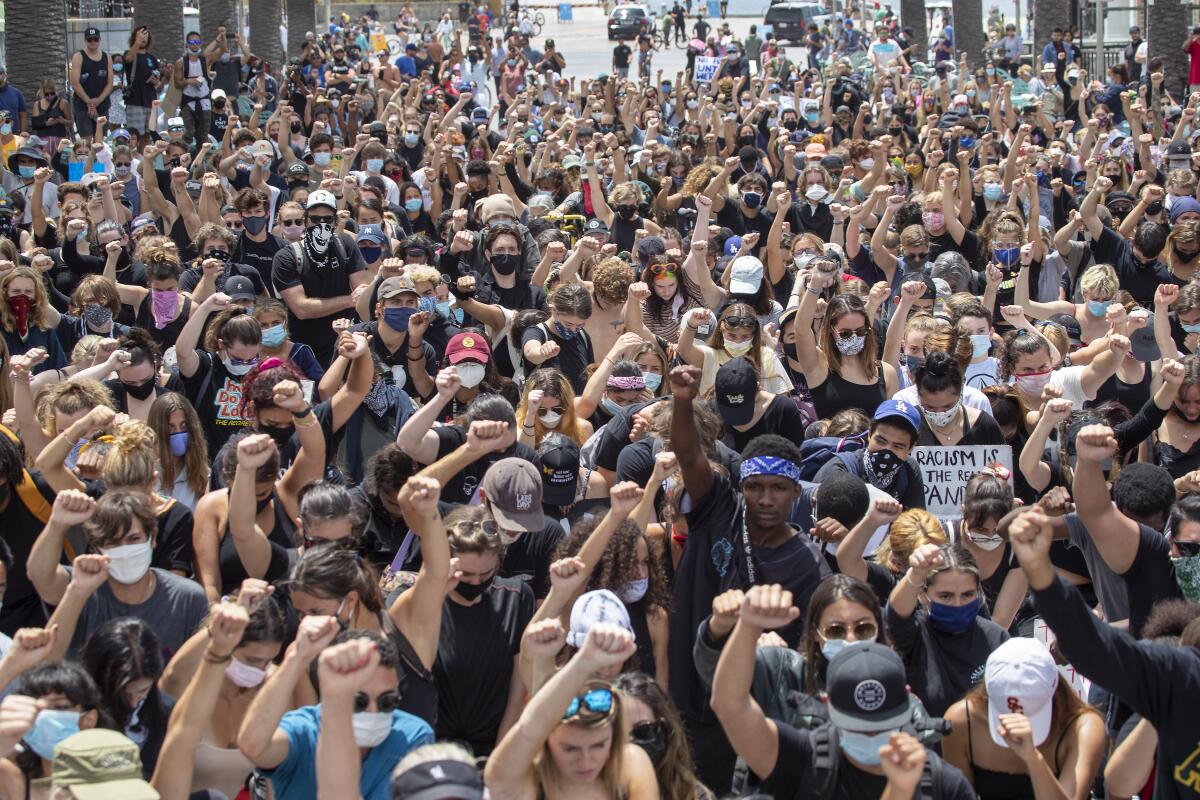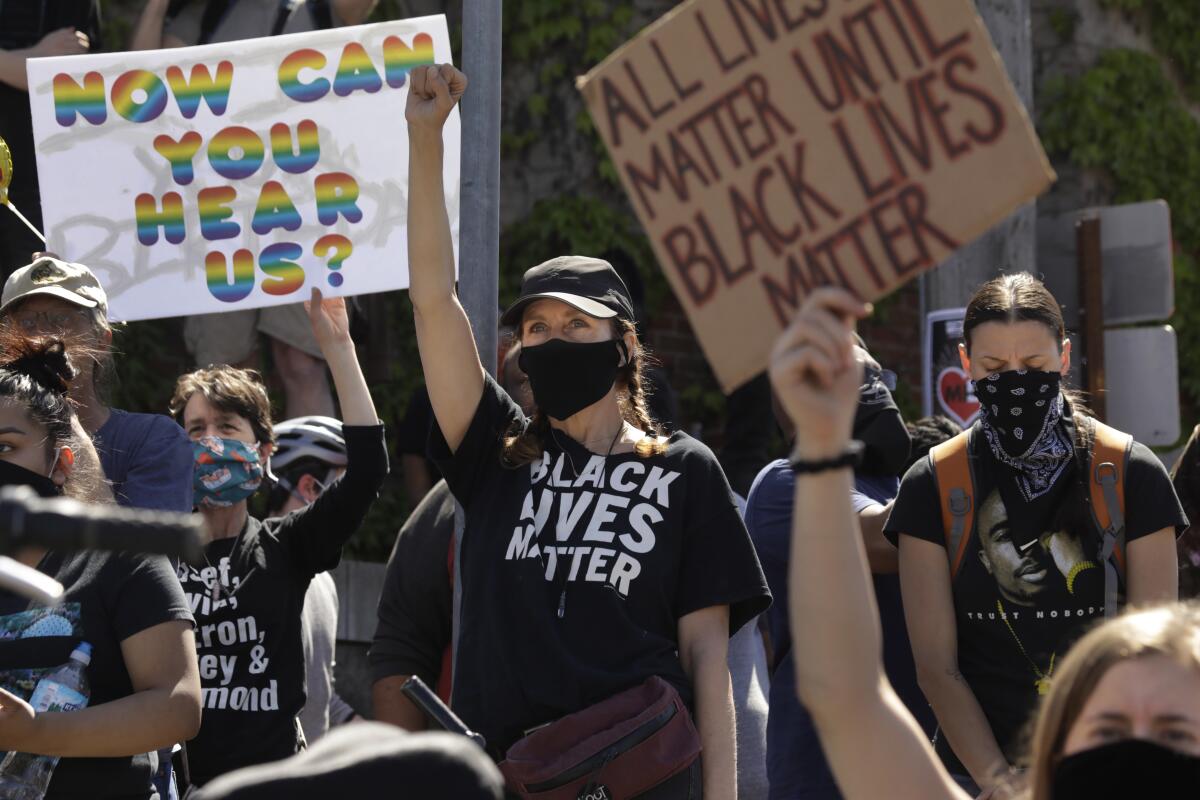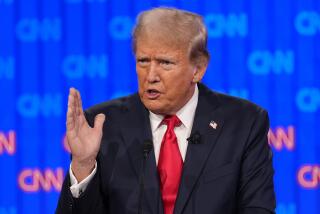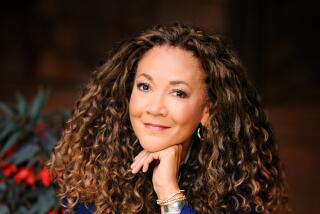In the midst of a racial reckoning, I’m wondering: What does whiteness mean?

- Share via
Is this what a revolution feels like?
In just a few weeks, a slow and steady trickle has become a tidal wave with incredible, deceptive speed — global pandemic be damned. Racism is finally at or near the top of America’s agenda, and I’m probably not the only one wondering: Why now?
It’s as though for years we’ve stood, necks craned, eyes squinted at the horizon searching for change, only to find it suddenly lapping at our ankles and swamping our front doors, washing away entrenched debates like so much flotsam.
I think part of the reason is the tireless work of Black Lives Matter activists across the nation who have never stopped calling out police violence and mass incarceration and created a movement that refuses to die.
And sometimes the news delivers a combination of stories that connects the dots for us and illuminates a truth as obvious as any constellation in the night sky. The pandemic showed us that racial and economic disparities have lethal consequences. Amy Cooper, Ahmaud Arbery, Breonna Taylor and George Floyd showed us that not only is police brutality against Black people lethal, but that some white people are aware of that disparity and willing and able to use it as a weapon, often without consequences.
These incidents happened in New York City, in the South and throughout Middle America. And everywhere it happened, it had happened before. And if those videos didn’t do it for you, we’ve also seen countless videos of police across the nation acting like an affronted gang, using illegal force, shooting protesters and journalists in the groin and face, protecting a statue of a racist police chief and former mayor in Philadelphia, pushing down a 75-year-old man in Buffalo and leaving him to bleed in the street, and slashing tires of protesters’ cars.
But one of the biggest reasons this moment feels different is how white people are acting, as Erin Aubry Kaplan wrote about in the L.A. Times last week.
Some illusory dam has broken in the minds of white people. A Civiqs survey showed a 15-point gain in support for Black Lives Matter among white people in just the last few weeks, reflecting the first time in the three-year survey that a majority of white people polled supported Black Lives Matter.
So this week I thought I’d write about white Los Angeles. But I quickly found myself defeated by how vague and poorly defined our ideas about white people are. How can you write about something that is everywhere and nowhere at the same time, that influences everything but is rarely directly named or discussed?
I’ve searched for books, scholars or articles about white Angelenos as a group, but I’ve found very little material. A search in L.A. Times archives also proved largely fruitless. In the news, white perspectives are treated as the default mainstream perspective, even though white people in Los Angeles have been a minority for several decades now.
Where is white Los Angeles? What do white Angelenos believe? What food do they eat?
Stymied in my research, last week I got in my car and drove up Fairfax to what seems to me to be the heart of white Los Angeles, toward Beverly Hills, where about 82% of the population is white. I parked at the Grove, where I saw columns of National Guard trucks and clusters of troops standing around with guns, called in two weeks ago to assist local law enforcement with policing the protests.
To me, it was an ominous sight. But there were also lines of people waiting for pictures with the National Guard, doing yoga poses in front of them and asking them to hold babies. Two white children biked by, cheerily thanking them for their service. Clusters of LAPD officers lounged around the historic and newly reopened Farmers Market, relaxing and talking quietly.
I suddenly found myself tongue-tied. One aspect of white Los Angeles that was immediately evident was how the community seems to have a favorable and trusting relationship with law enforcement. How do I interview these people about what seems to me to be an epidemic of racist police brutality when they treat the police like heroes? What good would it do for me to ask white people what it means to be white, when white people do not understand that for themselves, and might even find the very question itself offensive? What answers did I expect to get?
I had no idea, so I got back in the car. I drove past the Whole Foods, and I thought about the time a few years ago when I went inside to interview people about the drought, and a white woman thrust her soup cup into my hands and told me to throw it away.
Dutifully, I told her I was a reporter, and tried to hand her the soup cup back, but she refused it and walked away, telling me that she had a lot to do that day.
I found a trashcan about three feet away and threw away the soup cup. What else could I do? I grew up south of Nashville, and I’ve lived among white people all of my life. I knew that throwing away the cup would be infinitely easier than convincing a rich white woman that what she did was racist.
But these last few weeks have been different. White people have started to think about what it means to be antiracist. Even corporations are trying to find the right words, filling our inboxes with painfully sincere statements of solidarity. Even NASCAR has banned the Confederate flag. And in one amusing indicator of the confused good intentions of this moment, Google searches of the phrase “am I racist” have skyrocketed.
It’s been hard to laugh these past few weeks, but the image of millions of white people frantically asking a search engine algorithm to tell them if they are racist brought a real smile to my face.
And it was a reminder that presenting whiteness as an unspoken default worldview doesn’t just hurt people of color — it leaves some white people utterly confused when presented with the reality of race in America. The author Toni Morrison once pointed out that a focus on the victims of racism prevents us from understanding how the structures of racism have shaped its perpetrators.
So a mea culpa to my white readers, if you have managed to read this far. This column has offered a poor representation of whiteness. But if you know better, I challenge you to say so.
The question of what whiteness means is essential in an age when white nationalism is on the rise. Donald Trump is sometimes called our first white president because he created an electoral majority by directly appealing to white nationalism and white fears about losing their place at the top of a racial hierarchy. White identity politics are dominated by conservatives, Republicans and Fox News.
But what if whiteness could be defined by the thousands of white protesters we’ve seen marching to protest police brutality?

Whiteness is undergoing a fundamental evolution from “unmarked default” to “racially marked,” according to Nell Irvin Painter, a historian who wrote one of the only existing histories of white people in 2010.
“Eliminating the binary definition of whiteness — the toggle between nothingness and awfulness — is essential for a new racial vision that ethical people can share across the color line,” Painter wrote in a New York Times op-ed in 2015.
Only time will tell whether this is a moment or a movement. But what white people decide whiteness means will have a huge effect on the outcome.
More to Read
Sign up for Essential California
The most important California stories and recommendations in your inbox every morning.
You may occasionally receive promotional content from the Los Angeles Times.











